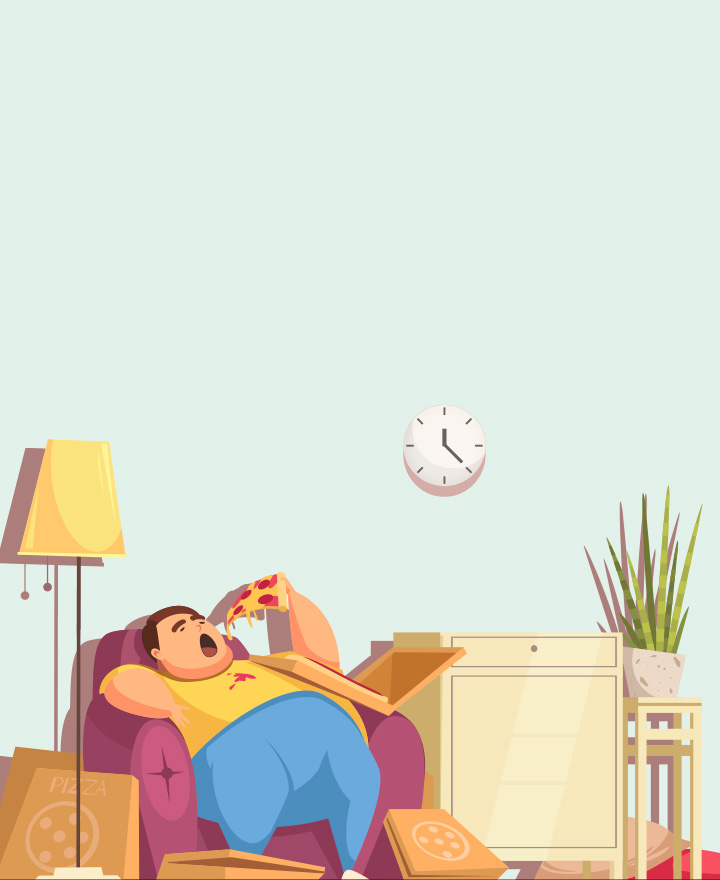

Binge Eating Disorder: Symptoms, Causes, and Treatment
People who cannot just stop eating are probably suffering from binge eating disorder (BED). Binge eating is an obsessive eating disorder compelling an individual to gorge and gulp food in large amounts. A person who has this disorder will eat continuously until he or she is uncomfortably full. Also, an individual with this issue will show this abnormal eating urge most of the time. The problem may have its roots in the person’s mind. If the mind is disturbed and distressed, it gets translated to an urge to eat as a means of relief.
Researchers believe that someone who binge eats at least once a week for three consecutive months is very likely to suffer from this disorder. This blog will tell you all about this disorder.
Symptoms
Common symptoms of binge eating disorder include:
• An uncontrollable urge to eat even when one is not hungry
• Eating desperately & rapidly
• Eating unusually huge quantities of food
• Eating until one feels uncomfortably full
• A kind of obsession with food
• Avoiding company while eating due to embarrassment
• Feeling guilty and ashamed later about such consistently uncontrollable eating
Causes and Risk Factors
Several factors influence an individual’s eating behaviour; for instance, biological and psychological factors and habits that one has acquired simply by learning from others could be possible causes of BED. The causes triggering binge eating vary from one person to another. However, researchers believe that this disorder has its roots in the human mind. Some people binge eat to give vent to their emotional distress. Eating can release pleasure hormones like serotonin and dopamine, making you happy for a certain period. But later, this may develop into an addictive tendency, compelling you to binge eat.
The risk factors associated with binge eating include:
• A family history of unorganised eating
• A family history of stress-handling dysfunction
• Depression, anxiety disorders, and mood disorders
• A personal history of dieting
• A personal history of addiction or abuse
• Attention deficit hyperactivity disorder
Impact on Mental and Physical Health
Binge eating is more complex than it seems to be. People with this disorder often indulge in food to escape from their debilitating emotions. However, binge eating can cause more mental distress. A person who binge eats may experience feelings of self-criticism, self-pity, shame, and guilt. These feelings can result in more depression, frustration, and tendencies to indulge in substance abuse.
The impacts of binge eating on physical health include obesity, diabetes, poor cardiovascular health, insomnia, GERD, polycystic ovarian syndrome, irritable bowel syndrome, pregnancy complications, and joint and muscle pain.
Diagnosis
The first step to diagnosing binge eating disorder is talking to the patient to understand his or her mental status. The healthcare professional may ask the patient to maintain a calendar to track the person’s eating habits over a month.
The other diagnostic tests include:
• Checking the patient’s body weight
• Checking the patient’s blood pressure
• Certain blood tests
• Urine analysis
Treatment Options
Treatment for binge eating disorder involves the intervention of a group of specialists or rather a team, which includes psychiatrists, dieticians, and other doctors who are specialised in treating the various physical impacts of binge eating. By addressing the mind first, the doctor tries to address this disorder.
Doctors may recommend CBT (i.e., Cognitive Behavioural Therapy), IPT (i.e., Interpersonal Psychotherapy), DBT (i.e., Dialectical Behaviour Therapy), Weight Loss Therapy, and medications (like antiepileptic drugs and antidepressants) to manage the condition effectively. An individual may be prescribed one or a combination of these modes of treatment, depending on the severity of BED.
Prevention Tips
If you are trying to get rid of this eating disorder, you must follow these preventative tips:
• Do not avoid going to the therapist
• Adhere to your diet plan strictly
• Do not skip your meals
• Make sure to take a nutrient-dense diet
• Stay away from foods that trigger binging
• Try to lead a physically active life
• Do not isolate yourself socially
• Note down your urge to binge and related mood swings in a diary
• Practice mindfulness and try to get 7-8 hours of restful sleep
• Talk to a friend/your spouse/a family member/a support group
Conclusion
Binge eating can indeed be an overwhelming and frustrating eating disorder, taking a toll on one’s physical and mental health. However, with the support of help groups, doctors, and dieticians, you can definitely cope with the situation and start living a healthy and happy life.
One of the important components of our overall wellness is also being financially secured. Healthcare emergencies can happen any time, but a good health insurance policy can protect you from such uncertain situations. To know more about Wellness and other health related tips, visit the wellness corner.
Source: niddk.nih.gov, healthline.com, clevelandclinic.org, avalonmalibu.com, mayoclinic.org
Disclaimer: This blog provides general information and discussions about health and related subjects. The information and other content provided in this blog, website or in any linked materials are not intended and should not be considered, or used as a substitute for, medical advice, diagnosis or treatment. Kindly contact your Doctor before starting a new medicine or health regime.
Related Articles
Everything You Need To Know About Disordered Eating
Is Therapy An Effective Treatment For Eating Disorders?
Treatment Guide For Eating Disorders
Yoga After Eating: Do's & Don'ts For Better Digestion
Published on July 22, 2024














 Health Insurance
Health Insurance  Travel Insurance
Travel Insurance  Car Insurance
Car Insurance  Cyber Insurance
Cyber Insurance  Critical Illness Insurance
Critical Illness Insurance
 Pet Insurance
Pet Insurance
 Bike/Two Wheeler Insurance
Bike/Two Wheeler Insurance  Home Insurance
Home Insurance  Third Party Vehicle Ins.
Third Party Vehicle Ins.  Tractor Insurance
Tractor Insurance  Goods Carrying Vehicle Ins.
Goods Carrying Vehicle Ins.  Passenger Carrying Vehicle Ins.
Passenger Carrying Vehicle Ins.  Compulsory Personal Accident Insurance
Compulsory Personal Accident Insurance  Travel Insurance
Travel Insurance  Rural
Rural